
Steely Dan is an American rock band founded in 1971 in New York by Walter Becker and Donald Fagen. Initially the band had a stable lineup but in 1974 Becker and Fagen retired from live performances to become a studio-only band, opting to record with a revolving cast of session musicians. Rolling Stone has called them "the perfect musical antiheroes for the seventies".

Pretzel Logic is the third studio album by American rock band Steely Dan, released by ABC Records on February 20, 1974. It was recorded at the Village Recorder in West Los Angeles, California, with producer Gary Katz. The album was Steely Dan's last to be made and released while the group was still an active touring band, as well as the final album to feature the band's full quintet-lineup of Becker, Fagen, Denny Dias, Jim Hodder, and Jeff "Skunk" Baxter, though it also features significant contributions from many prominent Los Angeles-based studio musicians.

Donald Jay Fagen is an American musician best known as the co-founder, lead singer, co-songwriter, and keyboardist of the band Steely Dan, formed in the early 1970s with musical partner Walter Becker. In addition to his work with Steely Dan, Fagen has released four solo albums, beginning with The Nightfly in 1982, which was nominated for seven Grammys.

Walter Carl Becker was an American musician, songwriter, and record producer. He was the co-founder, guitarist, bassist, and co-songwriter of the jazz rock band Steely Dan.
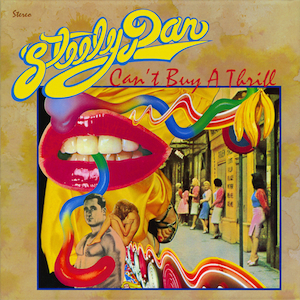
Can't Buy a Thrill is the debut studio album by American rock band Steely Dan, released by ABC Records in November 1972. It was written by band members Walter Becker and Donald Fagen, and recorded in August 1972 at the Village Recorder in Los Angeles with producer Gary Katz. The album is one of Steely Dan's most stylistically eclectic, encompassing the sounds of soft rock, folk rock, jazz-rock and pop, alongside philosophical, elliptical lyrics.

Aja is the sixth studio album by the American jazz rock band Steely Dan, released by ABC Records on September 23, 1977. On the album, band leaders Donald Fagen and Walter Becker pushed Steely Dan further into experimenting with different combinations of session players, enlisting the services of nearly 40 musicians, while pursuing longer, more sophisticated compositions and arrangements.

Countdown to Ecstasy is the second studio album by American rock band Steely Dan, released by ABC Records in July 1973. It was recorded at the Village Recorder in West Los Angeles, California, except for Rick Derringer's slide guitar part for "Show Biz Kids", which was recorded at Caribou Ranch in Nederland, Colorado. After the departure of vocalist David Palmer from Steely Dan, the group recorded the album with Donald Fagen singing lead on every track.

The Royal Scam is the fifth studio album by American rock band Steely Dan, released by ABC Records in 1976; reissues have been released by MCA Records since ABC Records was acquired by MCA in 1979. It was produced by Gary Katz. In the United States, the album peaked at number 15 on the Billboard Top LPs & Tape chart, and it has been certified Platinum by the Recording Industry Association of America (RIAA).
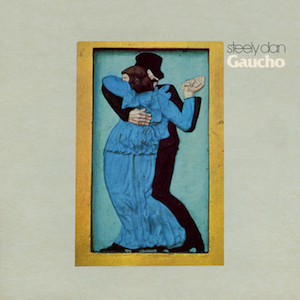
Gaucho is the seventh studio album by the American rock band Steely Dan, released by MCA Records on November 21, 1980. The album marked a significant stylistic shift for the band, with more focus on rhythm and atmosphere than their earlier work, but the recording sessions demonstrated the group's typical obsessive nature and perfectionism, as they used at least 42 different musicians, spent over a year in the studio, and far exceeded the original monetary advance given by the record label. At the 24th Annual Grammy Awards, Gaucho won Best Engineered Recording – Non-Classical, and was nominated for Album of the Year and Best Pop Performance by a Duo or Group with Vocals.
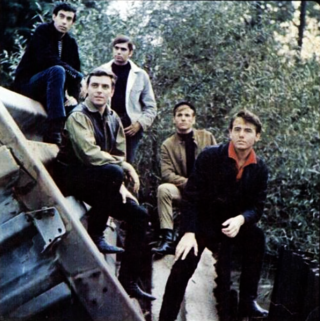
Jay and the Americans are an American rock group who formed in the late 1950s. Their initial line-up consisted of John "Jay" Traynor, Howie Kane, Kenny Vance and Sandy Deanne, though their greatest success on the charts came after Traynor had been replaced as lead singer by Jay Black and Marty Sanders were added to the line-up.
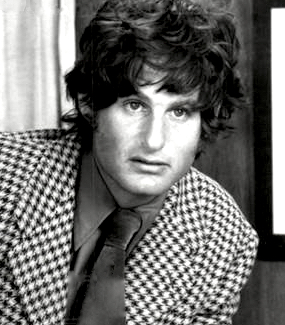
Zalman King was an American film director, writer, actor and producer. His films are known for incorporating sexuality, and are often categorized as erotica.

Stephen Landesberg was an American actor and comedian known for his role as the erudite, unflappable police detective Arthur P. Dietrich on the ABC sitcom Barney Miller, for which he was nominated for three Emmy Awards.

Michael H. McDonald is an American singer, keyboardist and songwriter known for his distinctive, soulful voice and as a member of the bands the Doobie Brothers and Steely Dan (1973–1974). McDonald wrote and sang several hit singles with the Doobie Brothers, including "What a Fool Believes", "Minute by Minute", and "Takin' It to the Streets." McDonald has also performed as a prominent backing vocalist on numerous recordings by artists including Steely Dan, Christopher Cross, and Kenny Loggins.
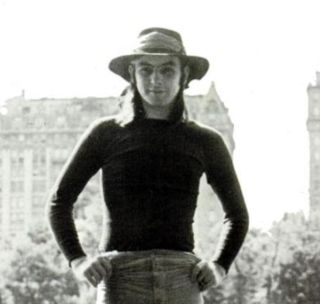
Elliott Randall is an American guitarist, best known for being a session musician and performing with popular music artists. Randall played the well-known guitar solos on Steely Dan's song "Reelin' in the Years" and Irene Cara's song "Fame". The former solo was ranked as the 40th best guitar solo of all time by the readers of Guitar World magazine and the eighth best guitar solo by Q4 Music.
Dennis Dias is an American guitarist, best known for being a founding member of Steely Dan.

"Pretzel Logic" is a song written by Walter Becker and Donald Fagen, released as a single by Steely Dan from their album Pretzel Logic, originally in 1974 by ABC Records. It reached number 57 in the Billboard charts.

Kenny Vance is an American singer, songwriter, and music producer who was a founding member of Jay and the Americans. His career spans from the 1950s to today, with projects ranging from starting doo-wop groups to music supervising to creating solo albums.

"FM (No Static at All)" is a song by American jazz-rock band Steely Dan, the title theme for the 1978 film FM. It made the US Top 40 that year when released as a single, a success relative to the film. Musically, it is a complex jazz-rock composition driven by its bass, guitar and piano parts, typical of the band's sound from this period; its lyrics look askance at the album-oriented rock format of many FM radio stations at that time, in contrast to the film's celebration of that medium.
"Aja" is a jazz rock song, with elements of jazz fusion and progressive rock, by the American rock band Steely Dan from the album of the same name, their sixth studio album, released in 1977. Composers Becker and Fagen play guitar and synthesizer, respectively, on the song, with various studio musicians playing the other parts; Fagen sings lead vocals. Production duties were handled by Gary Katz; the album was released through ABC Records. Musically, it is a tonally sophisticated and structurally complex work that was praised on its release as the most ambitious track the duo had ever attempted. The song's lyrics center around the interior monologue of a man who runs to the title character to escape the stresses of his life "up on the hill." Fagen claimed that it was inspired by a relative of someone he knew, who had married a Korean woman named Aja. He has described the song as being about the "tranquility that can come of a quiet relationship with a beautiful woman."
"Dirty Work" is a song written by Donald Fagen and Walter Becker of Steely Dan, which appeared on the band's 1972 debut album Can't Buy a Thrill.
















